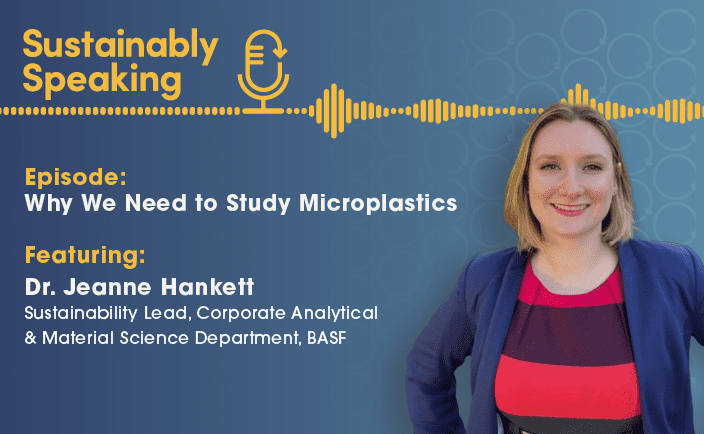In this episode of Sustainably Speaking, host Mia Quinn explores the critical role that science is playing when it comes to identifying solutions for microplastics pollution. Dr. Jeanne Hankett, Sustainability Lead, North American Biodegradation & Microplastics Center of Excellence at BASF, joins the show to discuss efforts to study and mitigate microplastics’ impact. Our conversation explores what we’re learning about the life cycles of plastics and efforts to enhance the scientific study of microplastics.
Microplastics are defined as plastic particles smaller than five millimeters. They are challenging to detect and can have primary or secondary origins. Studying the life cycles of plastics is crucial for reducing microplastics and allows the industry to develop more durable products and design items that degrade under controlled conditions.
The journey towards safeguarding from microplastics in our environment is a process that demands global collaboration. Our guest, Dr. Jeanne Hankett, Sustainability Lead, North American Biodegradation & Microplastics Center of Excellence at BASF, shares valuable insights from her extensive work in this field. Dr. Hankett also provides practical advice for consumers, encouraging proper recycling practices and awareness of compostable materials.
Dr. Hankett also discusses how innovation requires collaboration between scientists, industry experts, and academia. Advanced analytical techniques and collaborations between stakeholders on a global scale are crucial for addressing the complexity of microplastic pollution.
On This Episode:
 Dr. Jeanne Hankett, Sustainability Lead, North American Biodegradation & Microplastics Center of Excellence at BASF
Dr. Jeanne Hankett, Sustainability Lead, North American Biodegradation & Microplastics Center of Excellence at BASF
Jeanne is the Sustainability Lead in the Corporate Analytical & Material Science Department at BASF. She manages the North American Biodegradation & Microplastics Center of Excellence, the launching of regional analytics programs for sustainability, and an interdisciplinary team of colleagues. Jeanne collaborates daily with a diverse global network including academia & government, external stakeholders, and internal colleagues to advance the polymeric circular economy. Before joining BASF in 2017, Jeanne received her BS in Chemistry from the University of Illinois at Urbana-Champaign and her PhD in Analytical Chemistry from the University of Michigan, where she also conducted a research & teaching post doc. She is a thought leader for visible and invisible disabilities and mental health in STEM fields. In her spare time, she loves to hike & rock scramble with her husband and beagle, conduct baking experiments, and is constantly working on pottery projects.

Mia Quinn, Senior Director, Public Affairs at American Chemistry Council
Mia Quinn leads efforts to communicate the plastics industry’s major sustainability initiatives. She works to bring together experts to share insights in key areas of sustainability, including public policy, product design, recycling, and infrastructure.
She is passionate about collaboration, clear communication, and engaging audiences to learn more about innovation and modern solutions for our communities and our country.
Mia has a degree in political science from Washington University in St. Louis. She grew up in the suburbs of Denver, Colorado and is a lifelong Denver Broncos fan. She lives in Northern Virginia with her husband and two sons.



 Dr. Jeanne Hankett, Sustainability Lead, North American Biodegradation & Microplastics Center of Excellence
Dr. Jeanne Hankett, Sustainability Lead, North American Biodegradation & Microplastics Center of Excellence